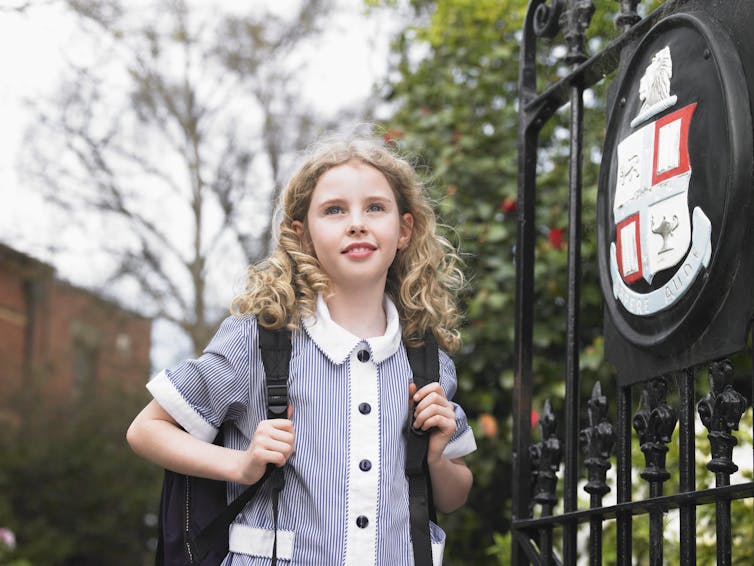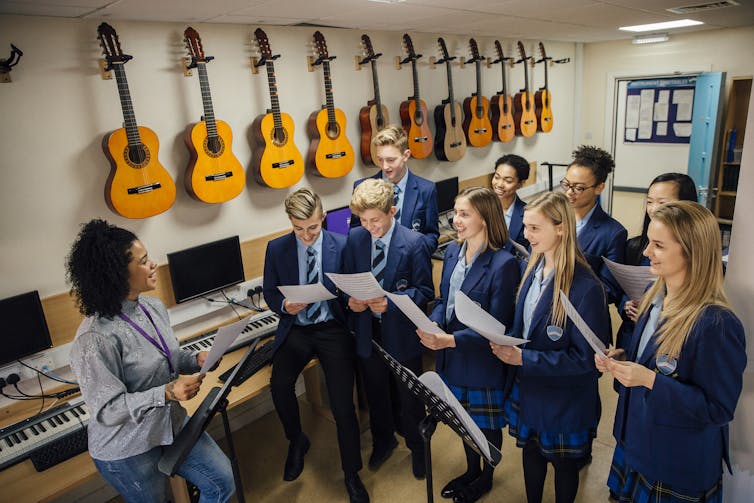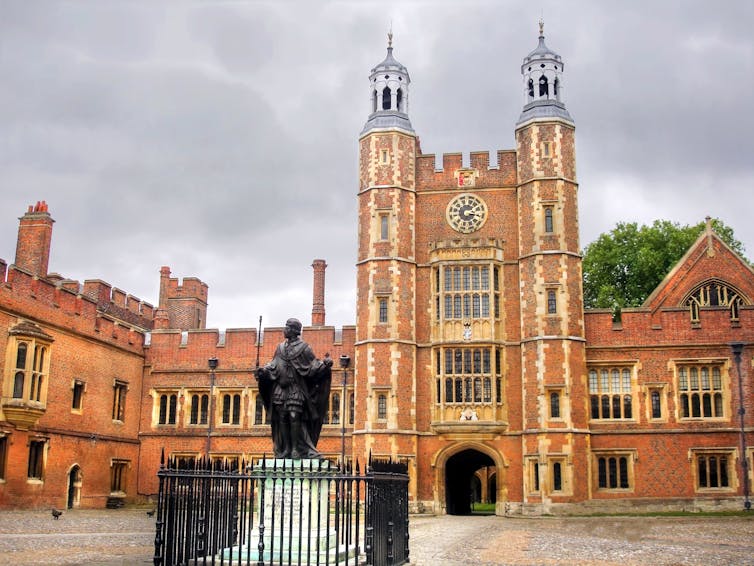Why Britain’s private schools are such a social problem
By Blog Editor, IOE Digital, on 19 February 2019

Shutterstock
19 February 2019
Private schools tend to be richly resourced and expensive, so those children lucky enough to attend them normally receive a good education, with academic advantages enhanced by a range of extra-curricular activities. But while this might be great for private pupils these schools pose a serious problem for Britain’s education system and society.
Britain’s private schools are very socially exclusive and there is no sign that attempts to mitigate this exclusivity through means-tested bursaries are working. The scale of bursaries is far too small to make a difference – just 1% of children go for free.
The exclusivity stems from the enormous price tag of private schooling. Fees average £17,200 a year per child, and are much higher for boarding schools. Some question whether the schools offer much in return for this parental investment: “Let them waste their money” writes one contributor to the Dadsnet internet forum – convinced from his experience that the quality of a private education is nothing special. But research indicates otherwise.
Large-scale studies confirm the clear academic advantages to be gained from going to a private school in Britain. This holds true, even after allowing for children’s prior abilities and for the fact that children tend to come from affluent family backgrounds. At each stage of education the progress made by the privately educated is modestly but significantly above that of state-educated children on average.
Better jobs with more money
Privately educated children also enjoy the many extra-curricular activities on offer. And they get all the guidance and advice they need to “work the system” in order to improve their chances of getting into a top university. The privately educated are twice as likely as similar state-educated children to achieve a place at one of Britain’s elite universities.
For fee-paying parents, nothing is guaranteed. But there is no doubt that their children’s life chances are bettered when they spend a part of their wealth in this way.

Shutterstock
This private advantage in Britain is unusual. In many other countries where there are an appreciable number of private schools, the fees – and the resource gaps between the private and state schools – are far lower. With the exception of some developing countries, you do not find much evidence of children at fee-paying schools doing notably better academically than other children.
Educational advantages naturally give Britain’s privately educated a huge helping hand in the labour market. Put bluntly, going to a private school gets you a job with higher pay. How high depends on age, gender and time period. Some estimates of the premium are as much as 35%.
Unfair and unequal
Only 9% of the overall population in the UK are privately educated, but they occupy an especially high proportion when it comes to positions of public influence: a third of MPs and top business executives, half of cabinet members and newspaper editors, three-quarters of judges –- the list goes on. This disproportionate influence on society detracts from Britain’s democracy.
Part of what comes with a private education is “positional”. It enables pupils to jump the queue for many of the high-status rungs of British society. Of course, this is privately advantageous, but socially it is of little overall value if others are held back.
This is enormously unjust in a world where education is so important to people’s life chances. Indeed, 63% of those recently contacted in a poll agreed it was unfair that “some people with a lot of money get a better education and life chances for their children by paying for a private school”. Only 18% disagreed.

Shutterstock
A good deal of private school spending, especially by the wealthier schools, is plainly extravagant: “Luxury country clubs with quite a nice school attached,” is how one journalist describes what private schools have become. Some of the resources devoted to Britain’s elites would go a lot further if directed instead to the educational needs of children from low-income families.
In our recent book Engines of Privilege the historian David Kynaston and I state the case for reforming these schools. Some proposals we set out would discourage parents – reducing the advantages of paying for private education. Other proposals would seek to partially integrate the private and state sectors to help change the social composition of private schools. Either type of approach would make a real difference.
Ultimately though, making these schools available to a wider and more representative population and making education less unequal is critical for the better functioning of society. Though such a move will not be easy, as there are vested interests capable of blocking policy changes. But as our book shows, serious reform is possible if there is sufficient political will.![]()
Francis Green, Professor of Labour Economics and Skills Development, UCL Institute of Education, UCL
This article is republished from The Conversation under a Creative Commons license. Read the original article.
5 Responses to “Why Britain’s private schools are such a social problem”
- 1
-
2
John Mountford wrote on 19 February 2019:
As pipe dreams go, this is a particularly ambitious one. I’ll believe such a change is even remotely possible when I see the slightest indication it could possibly get beyond the power-blockage that exists. Vested interest among the ‘takers’ trumps common sense, social justice and all attempts to create a society based on equality. Nevertheless, the inequity of the system needs no further investigation.
-
3
Manuela Willbold wrote on 25 February 2019:
As an educator having taught in Germany where private schooling isn’t as popular as in England where I now teach in private education, I would say the education system reflects society rather than creating it. Each system has its up and downsides. From my personal experience I would say that the family background in combination with the quality of the education matter the most for the learning and performance. However, there is strong evidence that in most cases students from more affluent backgrounds achieve higher positions with higher pay. You can read my article about the value of a university degree on my UK Education Blog for reference. Only if the mindset of a community or society changes, will the education system change.
-
4
internationalresidentialschool wrote on 28 February 2019:
I agree, all children have right to education and they shouldn’t be deprived of it whether they are wealthy or not.
-
5
somethingintrospective wrote on 16 April 2020:
The entire argument being made here hinges on the claim that the greater proportion of privately educated adults having “better jobs and more money” than those who are state-educated is being *caused* by the fact that they went to a private school.
Simply pointing out a greater proportion in one demographic compared to another is the meekest form of evidence one can have toward that argument. That’s the bare minimum necessary to form a hypothesis about the relationship between private education and life outcomes.
The only form of proper evidence for the above claim offered here is the academic paper which is cited twice in this article. But it doesn’t even address the relationship between private schooling and career outcome, it examines the relationship between private primary schooling and cognitive ability (of children, not adults with careers) at the end of the primary schooling period. It shows an 10% overall cognitive advantage for privately educated primary schoolers in 1970 and it doesn’t even have that measure for the most relevant cohort, those born in 2000, but only has reading capability, which improved by about 4%.
That is not enough to start claiming that private education in general is mediating some far-reaching social ill. Making that connection is just sloppy thinking for several reasons. Firstly, the paper cited lists off studies from the US and Australia which contradict that claim, so that’s reason to be cautious to begin with. Secondly, there’s evidence from the UK that contradicts the general conclusion of this paper on a measure that’s closer related to the claim your making: the grades of university students. See “Ethnicity has greatest impact on degree grades” from University World News. Quote: “School type has little impact. One key finding of the analysis is that attending an independent school does not appear to enhance university performance. Students who have remained in the state school sector for the whole of their secondary education tend to do better in their degree studies than those with the same prior educational attainment who attended an independent school for all or part of their secondary education.” Professors ought to be held to the highest standards of rational arguing, which means presenting if not discussing contradictory evidence. To not do so is a sign of confirmation bias.
Thirdly, reading ability and cognitive performance is not the same measure as who’s filling which job positions. Staking your entire argument about why 74%, instead of 7%, of judges are privately educated on this one study which shows the benefit of that private education is 10% better overall cognition seems to be boiling that ten-fold enrichment of judges among the privately educated down to such a meagre improvement in cognitive ability. That really seems like clutching at straws. You ought to be basing such strong claims about social ills on studies which actually measure the “ill” you’re referring to.
And fourthly, and probably most importantly, to me it’s conspicuous to choose to measure a variable as the output of the study which is known to be highly influenced by environment in children, but not in adults. The Wilson Effect shows that children up to the age of 11 still have an environmentally-sensitive IQ, while in adults this is diminished and IQ becomes about 70% due to genetic inheritance. I would imagine that many mental capabilities follow that trend, and so the effect in private schools found by this paper might not even continue to exist as adults, which is when you’re claiming it is relevant to social issues. I would suggest finding a study which groups large numbers of people according to their profession and observe their education history and IQ, along with any other potentially confound variables, and do a full multivariate analysis. I doubt that these egalitarian ideas would stand up to such a test.
Academics with progressive ideas need to seriously start making efforts to improve the rigour of their thinking. This “private schooling bad” argument is as idle and sloppy in it’s thinking as the claim that “poverty causes crime” claim and for the exact same reasons (taking only a cursory glance at statistics and effectively denying the antecedent as to why they are that way without consulting studies) with the exact same intent: justifying redistribution which will only be harmful.
“Ultimately though, making these schools available to a wider and more representative population and making education less unequal is critical for the better functioning of society.”
I don’t want the most elite positions of society to be representative of society. That appears to simply be a subjective preference of egalitarians. I want the most elite positions to be occupied by the best qualified, and even IF private schooling gave an advantage to people to BE the best qualified, I still wouldn’t see private schooling as bad. Quite the opposite. Many other people may think the same way as I do. Making these schools wider and more representative would I think go against the reason parents send their children to them in the first place: they’re aware of the dysfunctional delinquents their children will have to share a classroom with if they didn’t.
 Close
Close




Dear Francis,
This is very interesting. Although I’m somewhat aware that this can almost inadvertently read as an advertisement for private schools! For example, you convey that private schools are very well resourced, that private school graduates are more likely to have general success in life, and that private school graduates are more likely to access ‘top’ careers. That almost acts as marketing material for them, especially as I can’t access your book to read your full critiques.
(Although I do recognise that conveying ‘this is the problem’ involves unavoidably conveying all of those aspects.)
Unfortunately, I cannot afford to purchase your book, so I can’t read what your critiques and alternate proposals entail in detail. Are you planning to convey your insights through other mediums, for example open-access journal articles or reports?
(There might be a small amount of irony here, regarding paying for insights and benefits!)
Also, and out of curiosity, would you say that critical attention should perhaps focus more towards private schools rather than grammar schools?
Many of your colleagues and other commentators seem to critique grammar schools, for example, but seem to be curiously silent about private schools – despite, as you say, private schools essentially involving ‘pay to win at life’ and entailing massive amounts of inequality.
Best wishes!